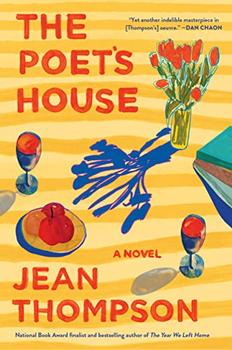Summary | Excerpt | Reading Guide | Reviews | Beyond the Book | Readalikes | Genres & Themes | Author Bio

Excerpt
The Poet's House
Before I met Viridian, I didn't know any poets, any real poets. "Real" meaning other people agreed that you were a poet, and published your poems in books and magazines, and made a fuss over you. Was she a famous poet? What did that even mean? What was a poet anyway? Was that a trick question? I didn't even know what to ask.
Viridian hadn't ever been on television, which is usually what famous means in America. Neither she nor any of her circle would have expected such a thing. Every so often a poet might be singled out and elevated by reading at a presidential inaugural, or the dedication of a monument, but that wasn't exactly steady work. People said that books of all sorts were losing ground to videos and podcasts and blogs. The whole enterprise of poetry had been pushed into a kind of outer orbit, unseen but still capable of exerting a gravitational pull, a slow shaping of thought and language that people call culture.
Of course, the poets themselves kept track of their prizes and awards and who had the hot hand. They gossiped and nursed intricate grudges among themselves. They harbored secret hopes of literary immortality, of their poems bursting into bloom a hundred years or more from now, like fireweed. And who was to say it wouldn't happen for them?
But these were all things I came to understand later. At the beginning, she was just Mrs. Boone, and I was there to put in some plantings she wanted.
What did I know about poets? Nothing, or maybe less. None of my schooling had exactly set my soul on fire when it came to literature. Poets wore berets and drank too much—this at least was often true—they lived in Paris or New York or they were already dead, they wrote about going down to the sea again, to the lonely sea and the sky, or else they wrote in scrambled words and sentences that an ordinary person couldn't follow, although they were no end impressed with themselves. I'd gotten along just fine so far without poetry.
I was so perfectly ignorant, an irresistible blank slate. No wonder everyone took it upon themselves to try and mold and educate me.
My boss, Rick, was going to meet me at Mrs. Boone's house so he could introduce us, as Mrs. Boone did not want people just showing up. "Even girls," Rick said, one more of his helpful remarks. He thought he deserved all kinds of credit for hiring me in the first place.
I had to be in San Rafael to drop off a part for an irrigation system, so it was no problem to head out west to Fairfax, where Mrs. Boone lived. It was May and the sky was already blue and hot, even early in the day. I hoped I could get the job knocked out before the air really started to cook. Northern California is supposed to have this perfect climate (in between mudslides, forest fires, and earthquakes), but a dry heat is still heat. It could get really hot in Fairfax, where the hills kept the cooler ocean air from piling in. Thirsty deer came down from the higher ground and munched the roses and vegetable gardens into stubs.
I reached the little downtown, with its yoga studio and coffee shops and ice-cream shop and brew pubs and natural food grocery. Fairfax used to have a doped-up, pleasure-seeking hippie vibe, and there was still an air of that left, even as the price of real estate had soared. More shiny new restaurants had opened, more of the old, haphazard houses had been torn down. The vibe was now more like expensive mindfulness. Green Party candidates won elections here; they actually ran things. Nationally owned chain stores were banned, as were pesticides, plastic bags, and Styrofoam. Fairfax was an official nuclear-free zone, for God's sake. Like nukes were some pressing local threat.
I lived in Petaluma, which was less than an hour away but was all box stores and fast food. It was fine with me. It felt more like the real world.
From The Poet's House by Jean Thompson. Reprinted by permission of Algonquin Books of Chapel Hill. Copyright © 2022 by Jean Thompson. All rights reserved.
Your guide toexceptional books
BookBrowse seeks out and recommends the best in contemporary fiction and nonfiction—books that not only engage and entertain but also deepen our understanding of ourselves and the world around us.